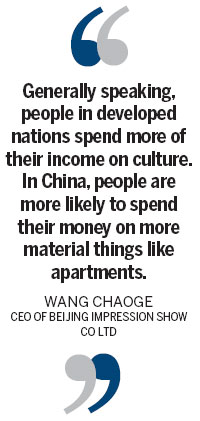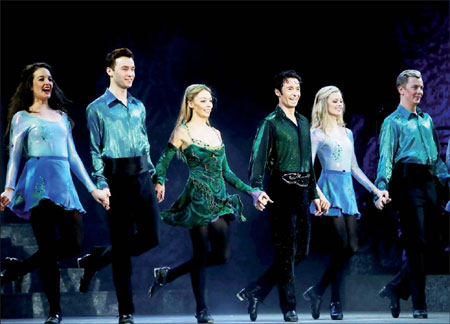Live-performance acts have market singing
Updated: 2013-07-05 09:49
By Mu Qian and Hu Haiyan (China Daily)
|
|||||||||||
|
Beizhan Performance Culture Co presented the Irish tap dance show Riverdance in China, and is planning a tour of the show in 40 Chinese cities next year. Provided to China Daily |

After sterling results last year, even more is expected from the cultural industry
The thriving market for live artistic performances looks set to continue as a result of rising living standards and government policies, and offers ever greater opportunities for overseas artists to perform in China, analysts and performance organizers say.
"After 30 years' growth, China is facing a transition of its economic structure, and cultural consumption will become more important," says Zhao Haisheng, deputy director of the bureau for external cultural relations with the Ministry of Culture.
The ministry's 2013 Report on the Performance Market says the mainland's artistic performances market was worth 60.3 billion yuan ($9.83 billion, 7.53 billion euros) last year, a rise of 60 percent on the previous year.
There were 2 million live performances on the Chinese mainland last year, 13,000 registered performing groups, 3,059 agencies and 1,966 venues, the report says. The number of private performing groups rose 25 percent to 10,000.
The Ministry of Culture is transforming its main role from controlling and managing cultural practices to making policy and providing services. Applications to perform on the mainland no longer need approval from the Ministry of Culture, a rule that came into effect on July 1. Instead, they are now being sent to provincial culture departments, greatly cutting approval time.
Li Rui, an official with the ministry, says that through the new policy the ministry hopes to become more service-oriented.
"The new policy will help increase the mobility of performances as cultural commodities, and improve the general environment of performances in China," Li says.
Zhang Ligang, general manager of Beizhan Performance Culture Co, says the streamlined application process means there will be more time to market and sell tickets to performances, which will help the industry grow.
However, some performance organizers are worried about different cultural departments applying rules inconsistently and some are worried about corruption if the approvals process is not properly supervised.
The Ministry of Culture said it would hold training programs for provincial cultural departments personnel.
For many domestic performance organizers, the thriving domestic market also augurs well for Chinese performers wanting to go abroad.
Wang Chaoge, 48, CEO of Beijing Impression Show Co Ltd, says she is excited about the potential of the country's culture industry.
"Although China's cultural industry is a long way behind that of the West, it has developed rapidly in recent years," says Wang, who, with award-winning director Zhang Yimou and Fan Yue, co-directed the opening ceremony of Olympic Games in Beijing in 2008. The three have worked together on seven open-air shows over the past 10 years.
Their most recent show was Seeing Pingyao Again, whose theme is the culture of Pingyao county in Shanxi province.
Wang says one of the biggest challenges for China's performance industry and culture industries is that Chinese people spend little on cultural pursuits.
"Generally speaking, people in developed nations spend more of their income on culture. In China, people are more likely to spend their money on more material things like apartments.
"But the industry has great potential. As people's living standards improve, their need for entertainment increases, which holds great promise for the performance industry."
Jiang Yingchun, general manager of Poly Culture, says that there is no reason why Chinese cultural companies including Poly, with their huge domestic market, cannot expand overseas and develop into big international brands.
Last year, revenue from the industry accounted for about 2 percent of the country's GDP, "a very small fraction that will certainly increase", he says.
Since Poly Culture was founded in 2000 it has become one of the largest domestic cultural enterprises, its business spanning areas including performance, theater management, cultural relics collections, auctions and cinema.
With performance as its core business, Poly Culture not only operates and organizes national and international tours of outstanding domestic performers, but also brings international performances to China. These have included the London Philharmonic Orchestra, London Symphony Orchestra, and musicals including Mamma Mia, Cats, and Notre Dame de Paris.
"With the huge domestic market and the potential for China's cultural industry overseas, and with our great combination of arts and business skills, there is no reason why Poly Culture can't become one of the world's biggest cultural enterprises," Jiang says.
However, if that is to happen, the industry needs to overcome serious shortcomings, not the least of which is a dearth of performing venues.
Last year the 13,000 performing outfits and 3,059 agencies across the country had just 1,966 theaters at their disposal. Rents are usually exorbitant, and continue to rise as a result of the shortage.
The China Association of Performing Arts has suggested that a chain of theaters be built and that a fund be established to help pay for theaters.
Jiang of Poly Culture says a chain theater system helps improve the way venues are managed, and Beijing Poly Theater Management Co Ltd, one of Poly Culture's subsidiaries, has developed a chain theater management business system.
The company now manages 32 first-class theaters across the country. It has also formed an alliance with several big theaters to promote business collaboration, share performance information and establish a national ticketing network.
Contact the writers at muqian@chinadaily.com.cn and huhaiyan@chinadaily.com.cn
(China Daily European 07/05/2013 page23)
Today's Top News
List of approved GM food clarified
ID checks for express deliveries in Guangdong
Govt to expand elderly care
University asks freshmen to sign suicide disclaimer
Tibet gears up for new climbing season
Media asked to promote Sino-Indian ties
Shots fired at Washington Navy Yard
Minimum growth rate set at 7%
Hot Topics
Lunar probe , China growth forecasts, Emission rules get tougher, China seen through 'colored lens', International board,
Editor's Picks

|

|

|

|

|

|






